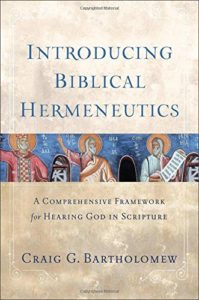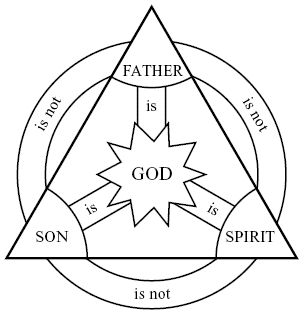 In Craig Bartholomew’s recent Introducing Biblical Hermeneutics, he gives eight guidelines for how the doctrine of the Trinity shapes biblical hermeneutics (8-15). If we want to interpret the Bible in a trinitarian manner, we should approach the Bible in this way:
In Craig Bartholomew’s recent Introducing Biblical Hermeneutics, he gives eight guidelines for how the doctrine of the Trinity shapes biblical hermeneutics (8-15). If we want to interpret the Bible in a trinitarian manner, we should approach the Bible in this way:
- A trinitarian hermeneutic approaches the Bible as authoritative Scripture. This is a simple corollary of the doctrine of the Trinity.
- A trinitarian hermeneutic approaches the Bible as a whole as Scripture. The NT and OT are not either on their own Christian Scripture, but only the totality of the witness together. This commits us to biblical theology and typology, which lead toward a unity of Scripture.
- A trinitarian hermeneutic views ecclesial reception of Scripture as primary. Scripture is primarily God’s Word to God’s people, so reception of his word through the ecclesia is primary.
- A trinitarian hermeneutic exalts and humbles academic interpretation. Academic is a partner to ecclesial reception of the Bible, which operates at the front line of its reception.
- A trinitarian hermeneutic will attend to the discrete witness of the Testaments. Each testament must be heard on its own terms (a la Seitz and Childs). Critical tools must be brought to bear on both testaments, especially the historical dimension of Israel’s life and Jesus’ life. But these tools are not neutral and we should allow for a plurality of approaches, while recognizing that only some are truly Christian. Each testament must be interpreted in dialogue with the other so that they shed light on one another. Understanding each section of Scripture in its relation to the canon as a whole is necessary.
- A trinitarian hermeneutic rightly discerns the goal of reading the Bible. The end goal is “obedient attention to God’s address through his Word” (12), and the facilitation of communion with God.
- A trinitarian hermeneutic does not close down but opens up interpretation of the Bible. This approach is only one of many, but it is the “right and truthful way to read Scripture, the way that will yield a truthful understanding of the Bible” (13).
- A trinitarian hermeneutic takes God’s address for all of life seriously. Scripture has something to say about all of life, from politics in the Old Testament to cultural engagement in the New Testament. We must keep one ear to the Bible and one ear to our culture.
At least two issues arise for debate for me. First, how one handles the dialogue between the two testaments is a significant and touchy issue. The canonical approach in the vein of Childs is a noble attempt to fuse critical scholarship with traditional hermeneutics, but raises problems of how Scripture is revelation, or authoritative, or why it is, or when it is (is each redaction equally authoritative? can redactors contradict one another? what happens to authorial intent after all the editorial stitching and canonical placements?). For anyone thinking through this issue, I highly recommend Understanding Biblical Theology, which lays out 5 approaches to biblical theology and gives a chapter on a major practitioner of each type.
Second, what does it mean for Scripture to be received within the ecclesia? “Interpretation in community” is becoming more trendy, but what does that really mean? Is it more effective to sit in a room with other Christians and discuss passages and theology than to sit alone in one’s study reading published works on the same issues? Does it mean one must simply dialogue with other Christians, past and present? If so, I suppose it would be hard to argue with that, but I’m not sure it means much more than that we do scholarship.
What about you? What quibbles do you have, or what guidelines might you add?
You can check out more of Bartholomew’s book here, or read about his philosophy of history he advocates for doing biblical theology.

